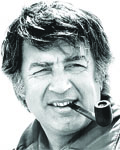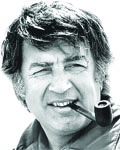
Faces & TracesMoustapha Akkad, a brilliant Muslim moviemaker in Hollywood [Archives:2008/1126/Culture]
February 4 2008
 |
Faces & Traces is a cultural series of concise biographies of local or international famous and obscure personalities in fields such as literature, arts, culture and religion in which these individuals contribute affirmatively. It is a short journey in contemporary history, attempting to tackle numerous effective characters in human civilization.
Syrian-American film producer and director Moustapha Akkad was born in Aleppo, Syria in 1935 to a poor family whose father worked as a customs officer.
Having been educated in and graduating from Aleppo schools, he went to the United States in 1954 to study film direction and production at the University of California in Los Angeles, where he studied how to stage motion pictures and television productions. Graduating in 1958 with a theatre arts degree, Akkad spent another three years obtaining a master's in cinema studies at the University of Southern California.
Completing his studies in the early 1960s, Akkad was anxious to get to work, so he began knocking on studio and television network doors in California. After a lengthy struggle searching for proper work, in 1962, Akkad met director Sam Peckinpah who became his Hollywood mentor through whom he received rigorous practical training. Peckinpah continued encouraging the young man until he found employment as a producer at CBS.
Thus, Akkad began his professional career in 1962 as a production assistant for Peckinpah in his movie, “Ride the High Country.” While working at CBS, Akkad produced “How Others See Us,” a TV series documenting how foreign students view Americans. A subsequent series, “Caesar's World,” was a travelogue featuring actor Caesar Romero visiting various parts of the globe.
Akkad eventually formed his own corporation, Akkad International Productions, for producing and directing documentary programs and television series.
Throughout his life, Akkad produced 13 movies, three of which he directed himself. Filmed in Morocco and Libya, his masterpiece, “The Message,” was released in 1976 in both English and Arabic.
It took seven years to raise funding, develop a script and then gain the approval for each page of dialogue from the foremost Islamic Sunni and Shi'ite scholars. When it finally was made public in the United States in 1977, it had a disastrous opening in Washington, D.C, where a sect of African-American converts to Islam stormed several capital offices and took hostages, demanding the film not be shown.
Starring Anthony Quinn and Irene Papas, the film is about the origins of Islam and other aspects from memoirs regarding Islam's Prophet Mohammed (pbuh). Costing around $17 million to make both versions, the English version alone earned more than 10 times that amount. Translated into 12 languages, the movie still is banned in some Arab countries today, including Egypt and Syria.
Akkad formed Filmco International Productions in 1978 to produce the first of eight “Halloween” movies – originally entitled, “The Babysitter Murders” – a low-budget spine-chiller that broke all box office records for an independent film with Akkad serving as executive producer. He later owned the long-running franchise that spawned seven further variations on the original Halloween theme.
The “Halloween” movie series includes: “Halloween II” (1981), “Halloween III: Season of the Witch” (1982), “Halloween 4: The Return of Michael Myers” (1988), “Halloween: The Curse of Michael Myers” (1995) and “Halloween H20: 20 Years Later” (1998).
In 1980, Akkad produced and directed his next epic project, “Lion of the Desert,” about real-life Bedouin leader Omar Mukhtar, who fought Mussolini's Italian troops in the deserts of Libya, thereby causing his arrest by the Fascists, who publicly hanged him.
Next, Akkad produced a 1985 horror movie entitled, “Appointment with Fear,” about a detective searching for a serial killer who lives in a fortified abbey. Departing from the horror genre, Akkad's “Free Ride” (1986) is a comedy about a young man who intentionally involves himself with gangsters in an effort to gain the attention of his lover.
The last Akkad-produced motion picture was 2002's “Halloween: Resurrection.”
Although he spent many years living in the West, Akkad dreamed of an Arab city for cinematic productions where films about the glorious achievements of Muslims could be made periodically.
Additionally, Akkad was in the process of producing an $80 million picture, for which he already had the script, to be filmed in Jordan and featuring Sean Connery about Saladin and the Crusades.
Throughout his life, Islamic causes such as Chechnya, Bosnia and Herzegovina and Andalusia occupied Akkad's thoughts; for instance, he wanted to produce a movie about Chechen leader Mohammed Al-Shishani, who fought Russian czars in Chechnya.
Akkad's other planned cinematic projects were about Sabiha, the Andalusian queen of Cordoba, and also about the delegations England's King John III sent to the Muslim caliph in Cordoba in 1213.
Akkad's social activism was evident, with his serving as early as 1965 on the advisory board for the Islamic Foundation of Southern California. Moreover, he steadfastly supported fundraising efforts of the National Association of Arab Americans and the American-Arab Anti-Discrimination Committee.
Akkad and his 34-year-old daughter Rima were killed during the 2005 bombings in Amman, Jordan at the Grand Hyatt hotel. His daughter died instantly, while Akkad succumbed to his injuries two days later on Nov. 11 and was buried in Aleppo.
Akkad was a brilliant man who brought the true story of Islam to life in the West through his exceptional international cinematic works.
——
[archive-e:1126-v:15-y:2008-d:2008-02-04-p:culture]


